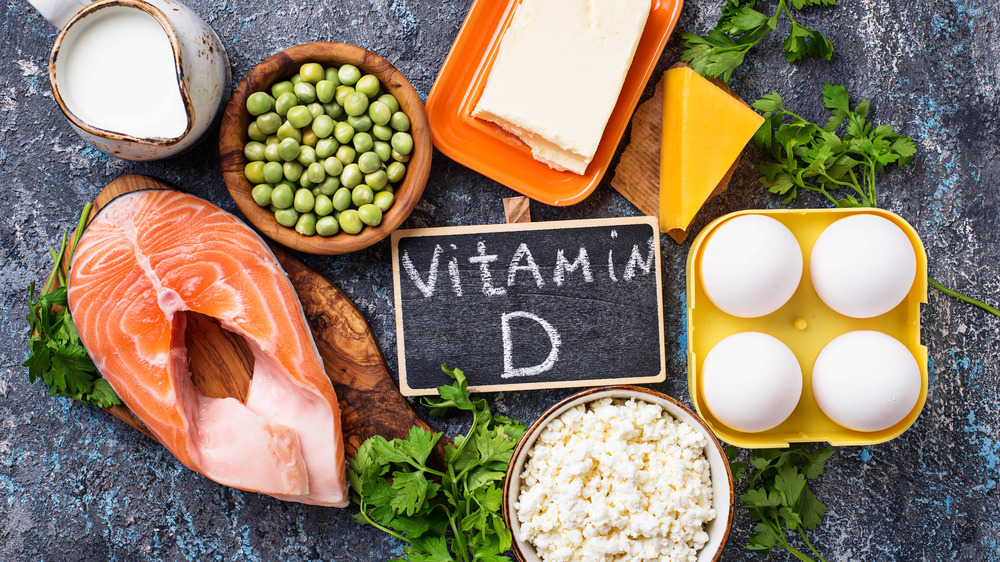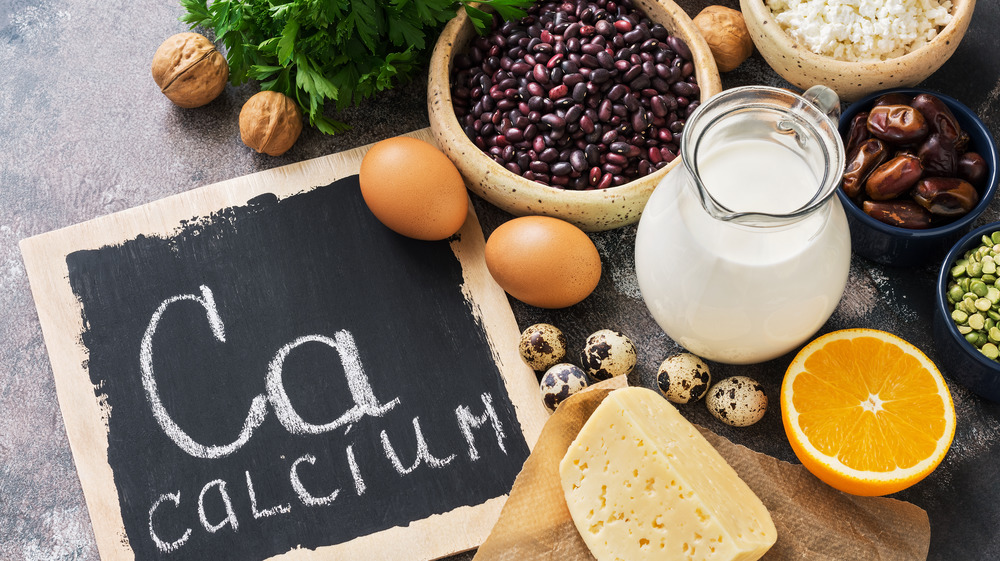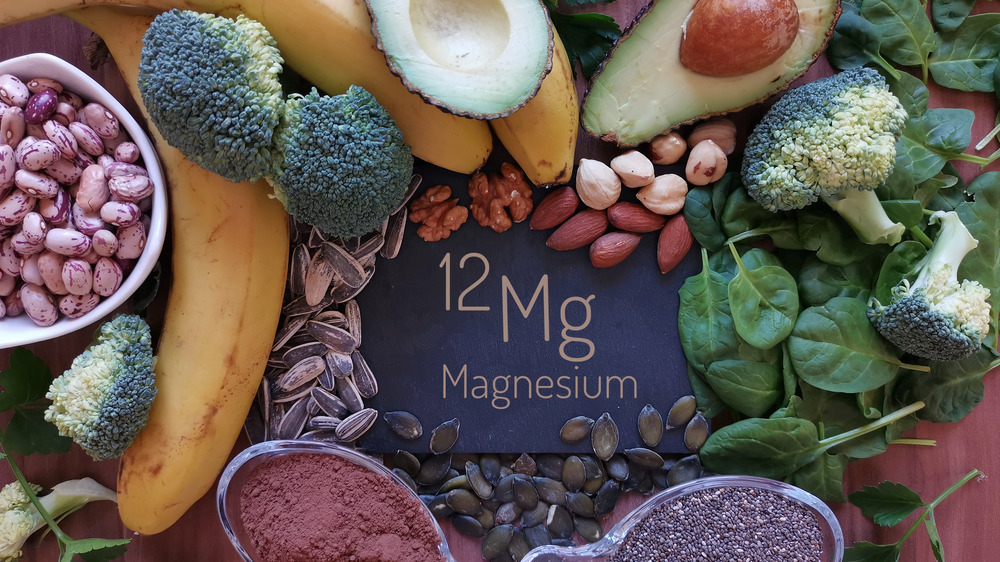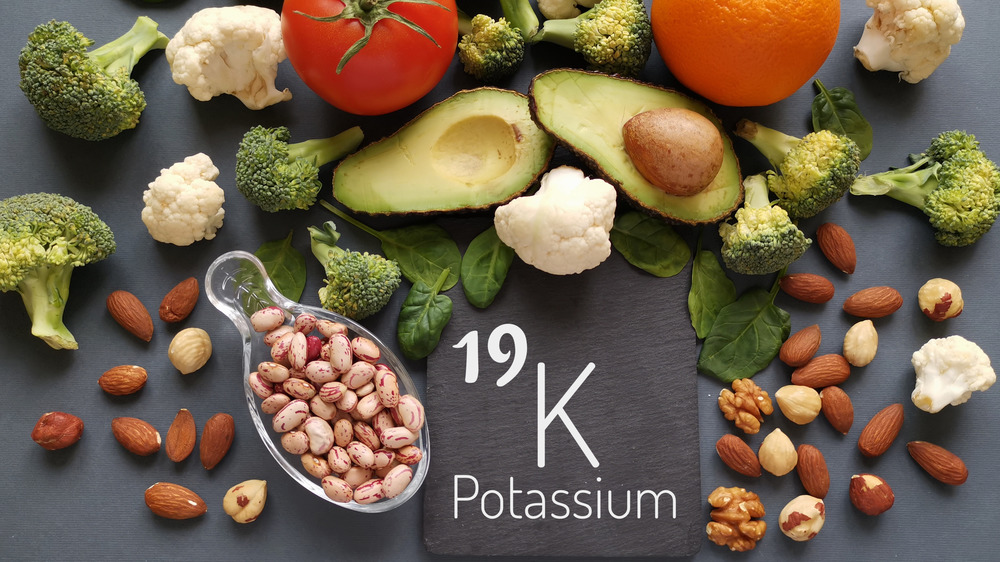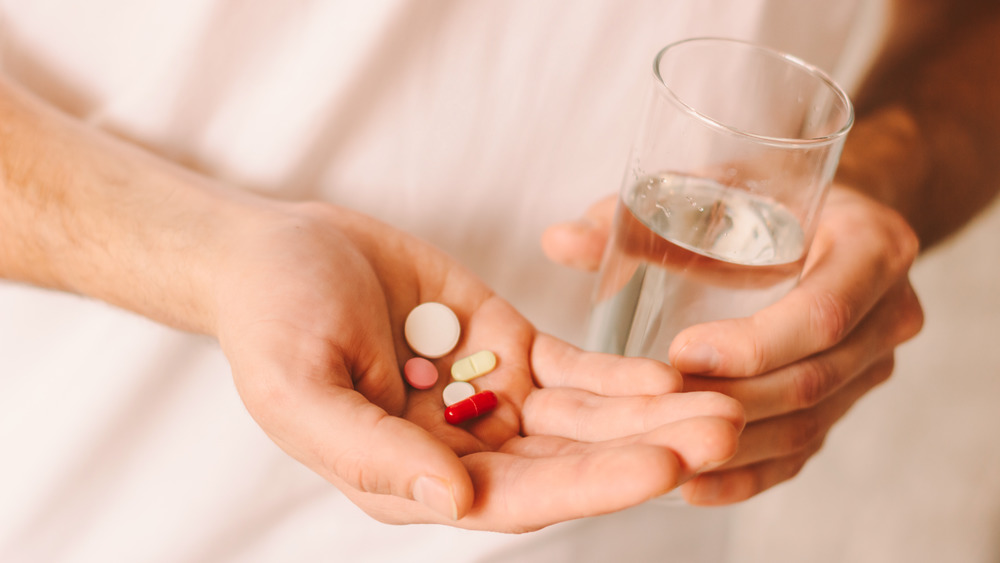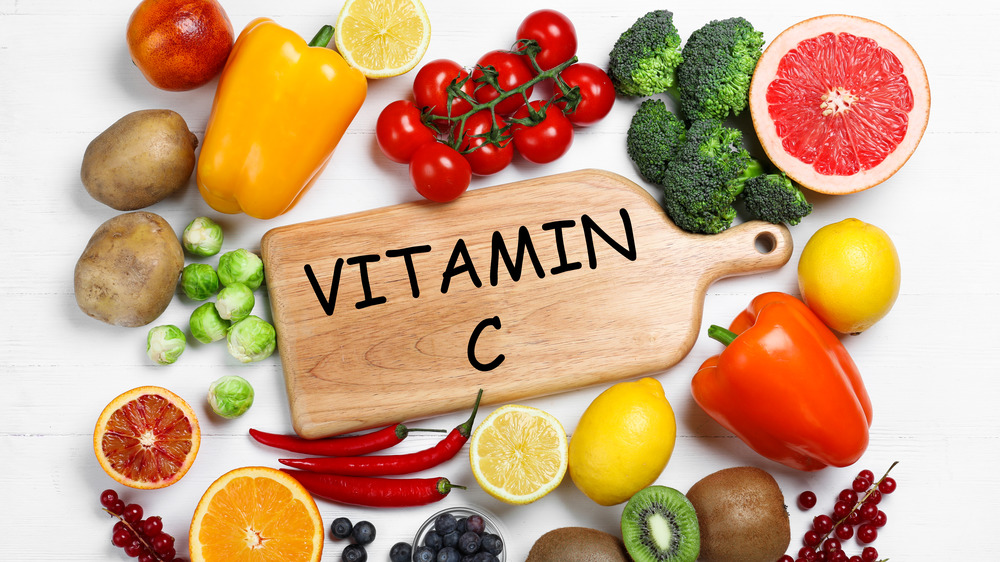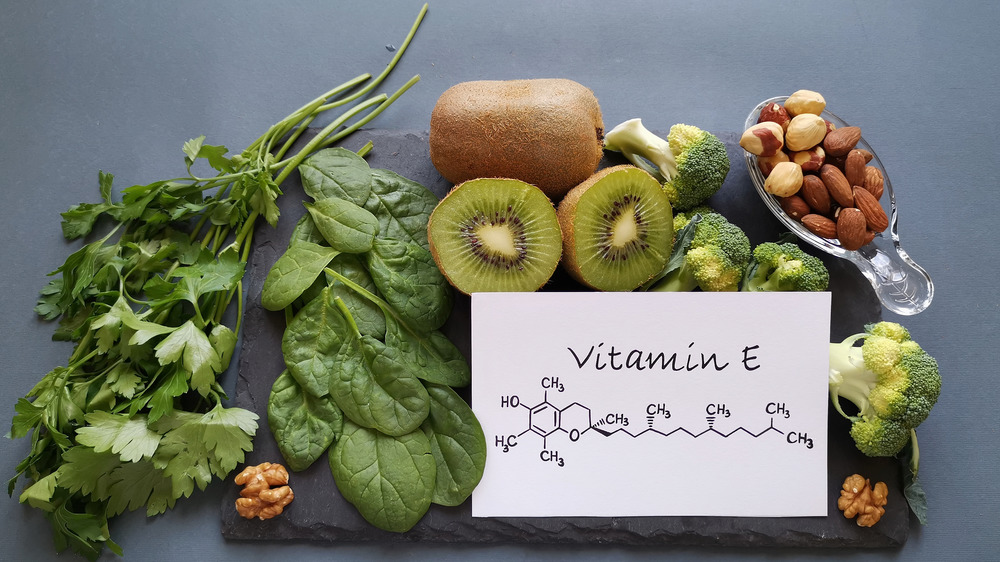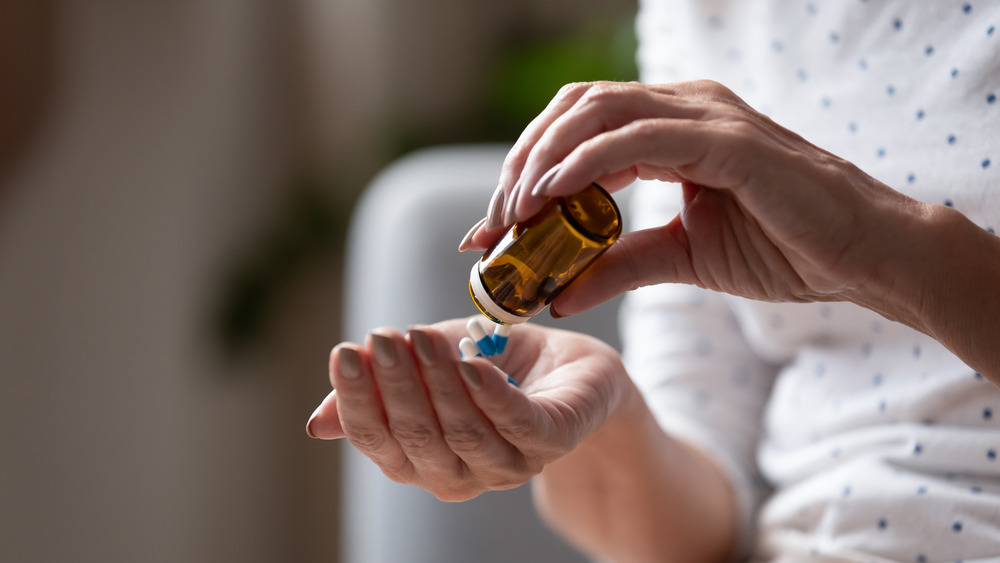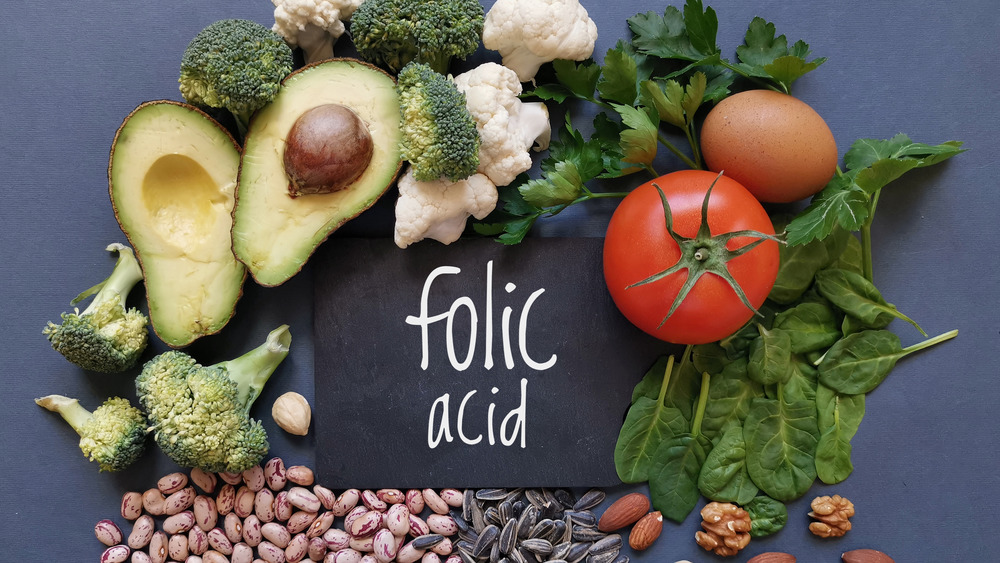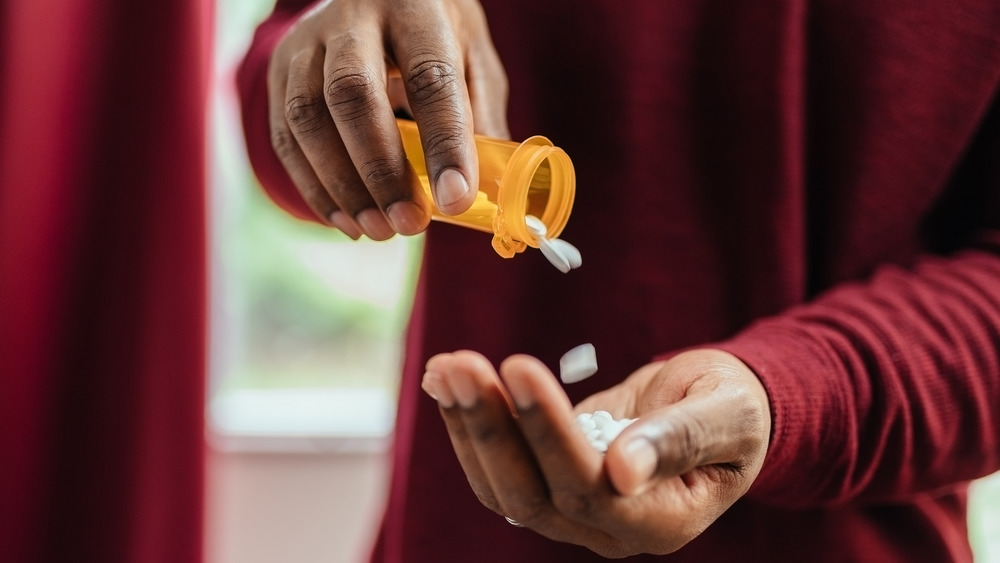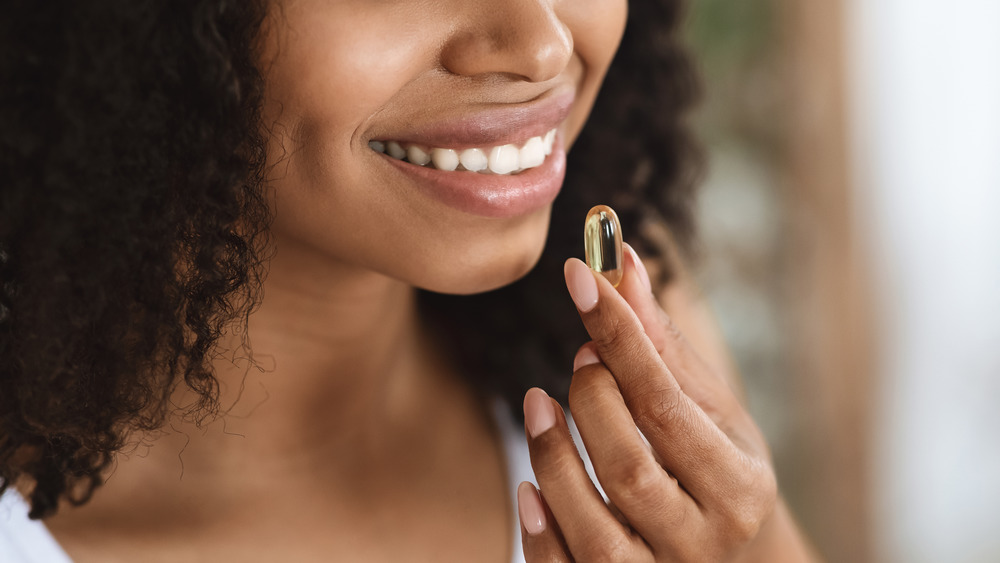Vitamins Your Body Really Needs To Get Every Day
The body needs vitamins, minerals, and nutrients to function at its best. And, while the body does store many of these for long periods of time, there are some that the body needs to replenish daily. We can find a lot of the vitamins, minerals, and nutrients that we need in many of the foods that we eat. But some are tougher to get adequate amounts of without taking daily vitamins or supplements — though pills should never replace a healthy diet.
"Pills are not a shortcut to better health and the prevention of chronic diseases," Larry Appel, M.D., director of the Johns Hopkins Welch Center for Prevention, Epidemiology, and Clinical Research, said, according to Johns Hopkins Medicine. "Other nutrition recommendations have much stronger evidence of benefits — eating a healthy diet, maintaining a healthy weight, and reducing the amount of saturated fat, trans fat, sodium, and sugar you eat."
With that said, here are the most important vitamins, minerals, and nutrients that your body needs on a daily basis — and how to get most of them in the meals that you eat.
Vitamin D
One of the most important vitamins for your body is vitamin D, as it boosts both your physical and mental health. Dr. Jessica Nouhavandi, lead pharmacist and co-founder of the accredited online pharmacy Honeybee Health, told Health Digest that vitamin D helps to strengthen the bones, control your mood, and prevent and alleviate depression.
It's easy to get your fix of vitamin D, too. According to the United States Department of Health and Human Services, you can get vitamin D from fatty fish, fish liver oils, fortified milk and milk products, and fortified cereals. Shannon Henry, a registered dietitian working for EzCare Clinic, which offers walk-in and online healthcare services for weight-loss plans, nutrition and diet therapies, and treatments, adds the vitamin D is "also known as the sunshine vitamin because your body produces it after sun exposure."
While you need vitamin D, your body does store it for quite some time compared to other vitamins, so it's not as imperative a supplement as other vitamins on this list. But make no mistake: You need it.
B Vitamins
The B vitamins are vital to your health — and it's important that you get most of them on a daily basis because they don't all stay in your system for very long. "Our bodies need a source of the water-soluble vitamins (the B-vitamins and vitamin C) every day since, with the exception of vitamin B12, we don't store these nutrients," nutritionist and registered dietitian Susan Bowerman, who serves as the senior director of Worldwide Nutrition Education and Training, told Health Digest. "So the list of vitamins you need every day would include all the remaining B-vitamins and vitamin C."
According to nutritionist Ann Ramar, the remaining B vitamins include vitamin B1 (thiamine), vitamin B2 (riboflavin), vitamin B3 (niacin), vitamin B5 (pantothenic acid), vitamin B6 (pyridoxine), vitamin B7 (biotin), and vitamin B9 (folate). "For anyone wondering about vitamin B8 and B4, these are vitamins that have been excluded in the list of essential vitamins since the body has been shown to produce enough of it by itself," Ramar explains.
According to Harvard, you can get all these B vitamins from meats and fish, and you can get many of them from grains, eggs, and vegetables.
Calcium
Calcium is a mineral that you need to keep your bones and teeth strong, according to the United States Department of Health and Human Services. Shannon Henry, a registered dietitian working for EzCare Clinic, told Health Digest that calcium supplements are standard for treating and preventing osteoporosis, as well. You can get it "from milk and other dairy, some forms of tofu, dark-green leafy vegetables, soybeans, canned sardines and salmon with bones, and calcium-fortified foods."
According to Dr. Alicia Armitstead with Healing Arts, calcium is the most abundant mineral in the body, and about 99 percent of it is found inside the skeletal system (the bones and teeth); the rest is stored throughout the muscles and organs. "Calcium is needed to control levels of magnesium, phosphorus, and potassium in the blood, since these minerals all work together to balance one another," she explains. "This is why it is so important to avoid calcium deficiency and strive to consume calcium-rich foods on a regular basis."
Magnesium
Magnesium is another mineral that you can generally find in foods that have high amounts of dietary fiber, according to the United States Department of Health and Human Services. These include green leafy vegetables, legumes, nuts, seeds, and whole grains, as well as some breakfast cereals and fortified foods with added magnesium. Likewise, you can get magnesium from drinking water, whether it's from the tap or from a bottle.
Certified nutritionist and owner and CEO of TheGymGoat.com, Reda Elmardi, explains that magnesium plays a critical role in your muscle contractions. "It is also a natural muscle relaxant and can support smooth muscles, including your intestines," Elmardi says. "It also supports another necessary vitamin, calcium, to absorb."
Men and women of 51 years of age and up should get at least 420 and 320 mg of magnesium each day, respectively, the United States Department of Health and Human Services recommends.
Potassium
Men and women alike need potassium, which can be found in a whole host of fruits, vegetables, meats, and types of dairy, according to the United States Department of Health and Human Services. Some foods that are particularly high in potassium include dried apricots, potatoes, and lentils, and some drinks include milk, coffee, tea, and more. Fruits and vegetables are the best places to get your potassium because they're naturally low in sodium and provide more potassium.
Potassium is important because it helps your nerves to function and your muscles to contract properly, according to the United States National Library of Medicine. Additionally, potassium helps to regulate your heartbeat and move nutrients into cells and waste products out of them. It may also "offset some of sodium's harmful effects on blood pressure."
According to the United States Department of Health and Human Services, men aged 51 and above need about 3,400 mg of potassium each day, while most women age 51 and older need about 2,600 mg of it on a daily basis.
Vitamin A
Vitamin A is an essential vitamin you need every day to support your immune system and vision. According to the National Institutes of Health, vitamin A is also involved in reproduction and cellular communication. Vitamin A also helps the heart, lungs, kidneys, and certain other organs to work as they should, Shannon Henry, a registered dietitian working for EzCare Clinic, told Health Digest.
Dr. Jessica Nouhavandi, lead pharmacist and co-founder of Honeybee Health, an online pharmacy, says that vitamin A can be found in dairy products like milk, beef liver, salmon, and some vegetables and fruits like carrots and mangoes.
"[Vitamin A is a] crucial vitamin [that] plays a key role in many of your body's daily efficiencies," explains Ashlee Van Buskirk, a fitness and nutrition coach and owner of WholeIntent. "Without a daily dose of vitamin A, you may be more susceptible to illnesses and your ability to produce healthy cells may also be negatively impacted."
Vitamin C
Vitamin C is incredibly important — and it's one of the most well-known vitamins (probably because it often comes in the delicious form of citrus gummy vitamins!). You can get vitamin C, also known as ascorbic acid, from eating your fruits and vegetables, like tomatoes, strawberries, peppers, kale, and citrus fruits, according to the National Institutes of Health. Vitamin C is a great antioxidant that protects the body's cells.
Shannon Henry, a registered dietitian working for EzCare Clinic, told Health Digest that vitamin C is critical to the development and repair of all body tissues. "It's involved in many body functions, including formation of collagen, absorption of iron, the proper functioning of the immune system, wound healing, and the maintenance of cartilage, bones, and teeth," she explains.
But that's not all vitamin C is good for. In fact, vitamin C is also imperative for your mental health. "Vitamin C is essential for making dopamine and serotonin, which enhance mood and prevent depression symptoms," says Lisa Richards, a certified nutrition coach, digestive health expert, and owner of The Candida Diet.
Vitamin E
Our bodies need vitamin E. "Vitamin E is an important vitamin required for the proper function of many organs in the body," explained Shannon Henry, a registered dietitian working for EzCare Clinic, to Health Digest. "It is also an antioxidant. This means it helps to slow down processes that damage cells."
In short: Vitamin E is a super helpful antioxidant that protects the body's cells from any damage against free radicals, and you can find it largely in nuts and many vegetables like spinach and broccoli. According to Harvard, vitamin E "[neutralizes] unstable molecules that can damage cells," protects vitamin A and some lipids from damage, and can even help prevent Alzheimer's disease.
Contrary to popular belief, however, vitamin E does not prevent your skin from forming wrinkles or slow down the aging process in any way, according to Harvard. It is, however, nevertheless important to get enough vitamin E every day to make sure that your cells can function at their best.
Iron
It's essential that your body gets enough iron every single day. According to the National Institutes of Health, iron is a mineral that is naturally present in many of the foods we eat. Eat your beans, lentils, dark leafy greens, lean red meats, nuts, dried fruits, and shellfish to get a diet rich in iron. However, iron is also added to many food products and available as a dietary supplement.
Iron is essential in the process of transferring oxygen from the lungs to the tissues, supporting muscle metabolism and healthy connective tissue, and allows growth and neurological development.
"Your body absolutely needs to receive iron on a daily basis in order to make enough new red blood cells," Ashlee Van Buskirk, a fitness and nutrition coach and owner of WholeIntent, told Health Digest. "Without enough red blood cells, your cardiovascular system will struggle to bring enough fresh oxygen to your entire body. And when you don't have enough iron in your blood, you can develop anemia, which can lead to symptoms like fatigue, shortness of breath, lightheadedness, and dizziness." She also explains that an iron deficiency can lead to learning difficulties.
Folate
According to Harvard, Folate is a key vitamin in spinach, asparagus, and other greens and foods that your body needs. Folate (also known as folic acid) is one of the most important and, yet, overlooked or misunderstood vitamins, according to Kelsey Neyman, certified health coach for Cauli Crunch. "Because it's generally regarded as a prenatal vitamin, people disregard it as a daily essential."
But folate is one of the aforementioned B vitamins that deserves its own shoutout. It helps your body convert the food you eat into energy that powers your brain, improves your focus, and boosts your mental health, Neyman explains. But that's not all. "If you're looking for stronger, fuller hair and nails, folic acid can assist," she adds, noting its role in generating new cells.
Folic acid has also been linked to improving your cardiovascular health, Ashlee Van Buskirk, a fitness and nutrition coach and owner of WholeIntent, told Health Digest. "In fact, folic acid plays a key role in reducing your risk of heart disease by decreasing the amount of homocysteine in your blood. It's an essential nutrient for your overall health, and it's critical for your brain's functionality."
Zinc
Zinc is vital to your hormonal health, immunity, cell growth and repair, and digestion, Dr. Alicia Armitstead with Healing Arts told Health Digest. Zinc can even help you with your weight loss or gym goals. "[Zinc] helps our body use carbs, proteins, and fats effectively to help balance your metabolism and allow you to lose weight or build muscle," according to Jamie Hickey, a trainer, nutritionist, and the founder of Truism Fitness.
But a zinc deficiency can lead to a whole host of health issues regarding your hormones and digestion. That's why it's important to eat a diet that boasts plenty of zinc.
"Unfortunately because the body needs so much zinc, behind only iron, it's the second-most-abundant trace mineral in the human body, it's easy to be deficient in zinc," Dr. Armitstead says. But there are foods that provide zinc. "Oysters actually contain the most zinc of any food. Lamb, grass-fed beef, and chickpeas all have a good amount of zinc, and so do cashews and pumpkin seeds."
Vitamin K2
Vitamin K2 isn't probably one that you've heard much about. It's certainly not as commonly talked about as vitamins C and D, for example. But the conversations surrounding vitamin K2 are increasing within the medical community, due to new studies that cite K2 deficiencies with severe COVID-19 outcomes, according to Dr. Trygve Bergeland of Kappa Bioscience, a global supplier of vitamins. A study out of Cambridge suggests that a lack of Vitamin K may have an effect on lung damage and thromboembolism in Coronavirus cases.
"K1 is easily found in a balanced diet, which is not the case for K2," Dr.Bergeland said, according to Nutraceutical Business Review, in an article about the study. "Deficiency might be more common than we think."
More research needs to be done about the role vitamin K2 may play in the COVID-19 crisis. "There is a need for further experimental evidence to link vitamin K deficiency with the pathology of COVID-19 and determine whether vitamin K2 supplementation has a place in treatment protocols," the researchers say, according to the Nutraceutical Business Review.
Fiber
The heart and digestive tract need fiber, plain and simple. "Fiber is a nutrient that supports a healthy heart by reducing blood cholesterol," Sylvia Melendez-Klinger, a global nutrition entrepreneur and the founder of Hispanic Food Communications, a nutrition communications and culinary consulting company, told Health Digest. "It also promotes a healthy digestive system."
How does it do this? Well, fiber basically cleans out all of the bacteria and any buildup in your intestines. This helps to keep your bowel movements regular, reducing constipation and your risk of developing colon cancer, according to Benioff Children's Hospital.
So, where do you get your fiber? Fruits as well as grains (enriched and whole) offer great sources of concentrated fiber. "A 2017 Nutrients study found that if only whole grains were required in the diet, with enriched grains or other substitutions not allowed, people would be at risk for nutritional deficiency."
The body can also go without any vitamins
Our bodies need vitamins, minerals, and nutrients for us to survive. But the reality is that our bodies do hang onto many of these for a little while by storing them in various parts of our systems. So some play devil's advocate, arguing that you don't really need any vitamins every single day because, in fact, the body can go some time without eating at all.
"There are actually no vitamins that our body needs every day," Ben Tanner, founder of Fasting Well, told Health Digest. Tanner has been a physician assistant in family practice, emergency medicine, and urgent care for over a decade. "How do I know this? Because people can fast for days on end without any significant adverse health consequences. In fact, their health significantly improves from fasting!"
While Tanner admits that certain quantities of some vitamins and minerals stay stored in our livers and other places, so the body would still have access to them while fasting, he says that you can go a few days without certain vitamins.


